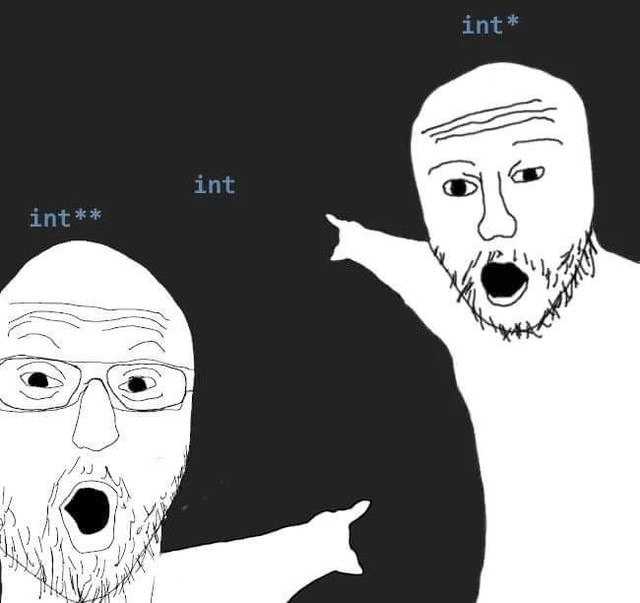Honestly, I encounter this problem not for the first time ☹️ Because after languages like Java, Python, JavaScript where non trivial objects passed by reference, you may forget that in C/C++ values are passed by value. In another words, functions always work with copies.
Simple question today: what is the outcome?
#include <iostream>
struct SimpleStruct {
int bar;
};
void foo(SimpleStruct* s) {
s = new SimpleStruct;
s->bar = 42;
}
int main(int argc, char const *argv[])
{
SimpleStruct* x = nullptr;
foo(x);
std::cout << x->bar << std::endl;
return 0;
}Sadly but program from my example will crash with seg fault. Function foo does only local changes, while x stays equal to 0.
Let's review another example, this time trying to free memory in the foo function.
#include <iostream>
struct SimpleStruct {
int bar;
};
void foo(SimpleStruct* s) {
std::cout << s->bar << std::endl; delete s; s = nullptr;}
int main(int argc, char const *argv[])
{
SimpleStruct* x = new SimpleStruct;
x->bar = 42; foo(x);
if (x) std::cout << x->bar << std::endl; return 0;
}To fix seg fault and to implement our intent properly we can pass the pointer by reference
#include <iostream>
struct SimpleStruct {
int bar;
};
void foo(SimpleStruct* &s) { s = new SimpleStruct;
s->bar = 42;
}
int main(int argc, char const *argv[])
{
SimpleStruct* x = nullptr;
foo(x);
std::cout << x->bar << std::endl;
delete x; return 0;
}Maybe hide pointer behind a typedef and it will look fine. Another solution that I've seen in many C interfaces is a double pointer
#include <iostream>
struct SimpleStruct {
int bar;
};
void foo(SimpleStruct** s) { *s = new SimpleStruct; (*s)->bar = 42;}
int main(int argc, char const *argv[])
{
SimpleStruct* x = nullptr;
foo(&x); std::cout << x->bar << std::endl;
delete x;
return 0;
}I just recently saw a meme about pointers that will explain what's going on under the hood 🤣
By the way, all of my initial examples are leaking memory. Nothing of it would happen if I have used smart pointers. So take a look on a clean C++ approach:
#include <iostream>
#include <memory>
struct SimpleStruct {
int bar;
};
void foo(std::unique_ptr<SimpleStruct>& s) {
s = std::make_unique<SimpleStruct>();
s->bar = 42;
}
int main(int argc, char const *argv[])
{
std::unique_ptr<SimpleStruct> x;
foo(x);
std::cout << x->bar << std::endl;
return 0;
}The output is 42 now.
As usual all code for your experiments and slides are in cpp-skill repository.
